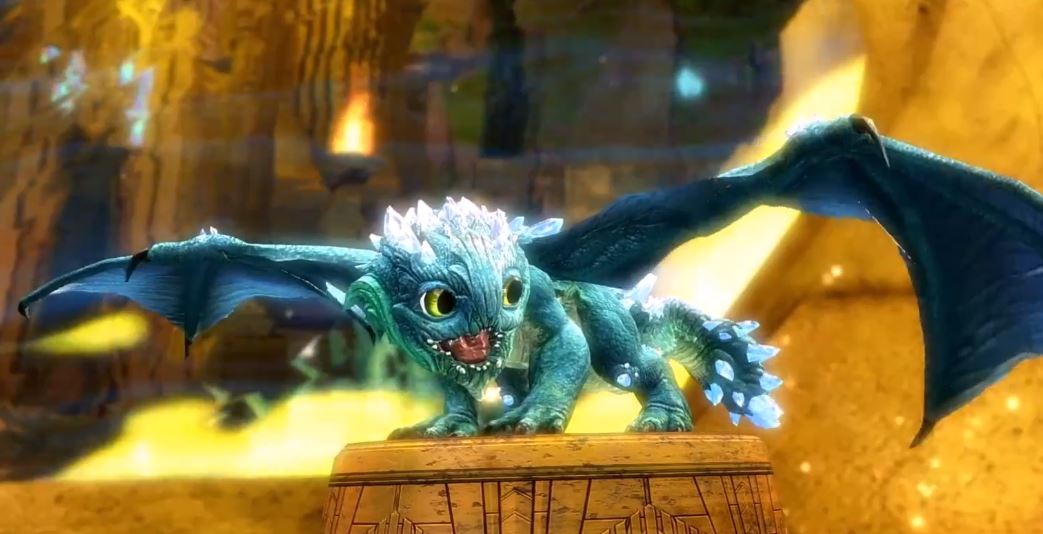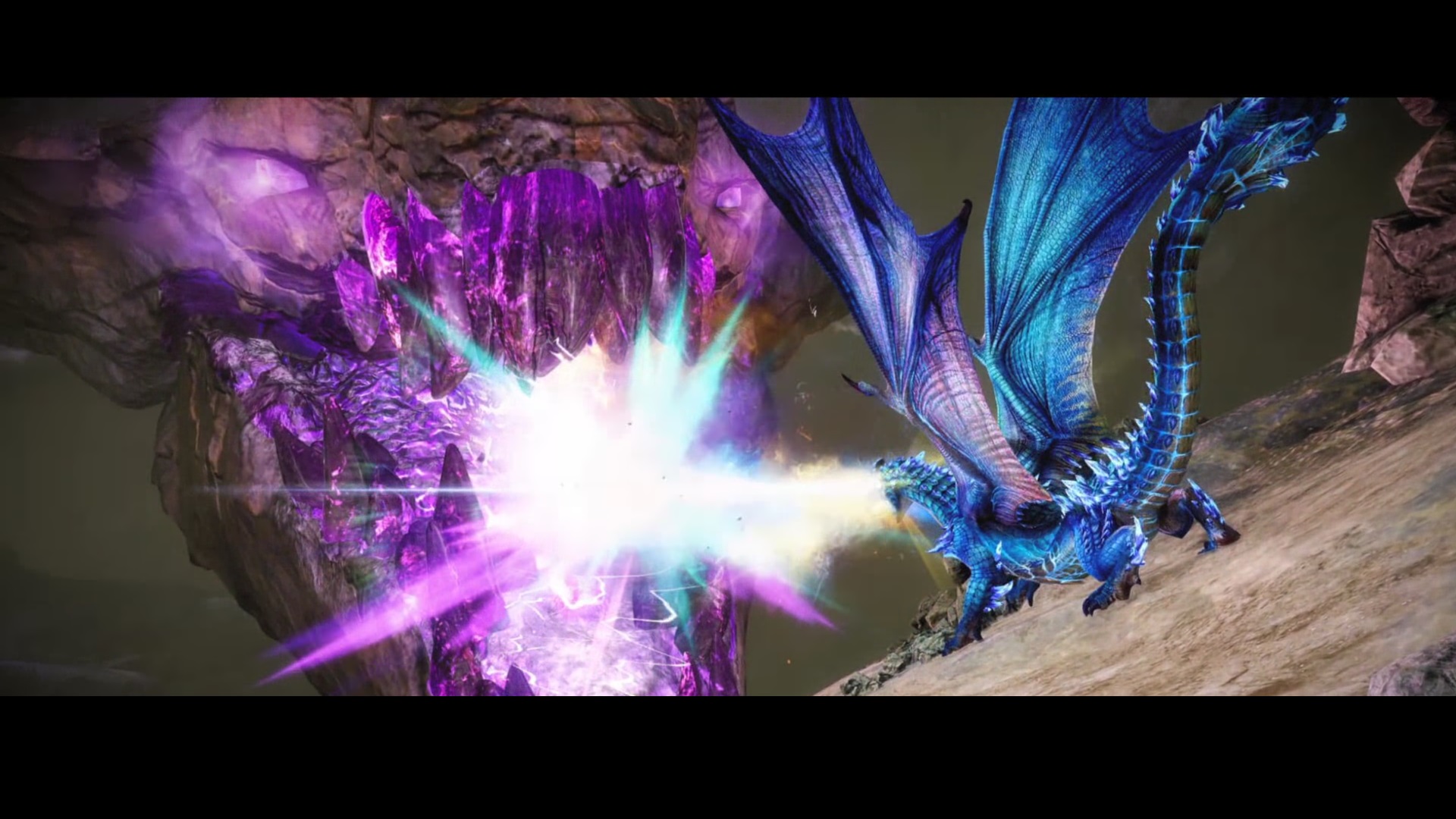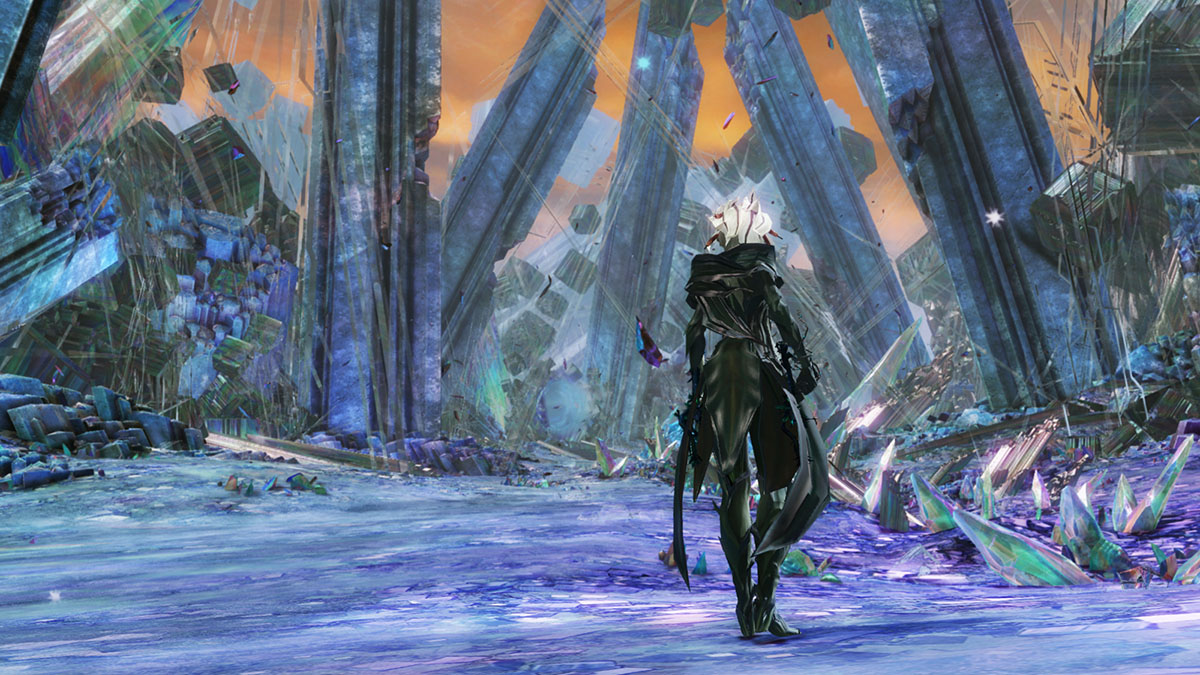ArenaNet talks about the dramatic ending of Guild Wars 2's latest episode
They even weighed in on some of your fan theories.

Spoiler warning: This interview goes into detail about the events of Guild Wars 2's latest episode.
Every once in a while, a development team decides that it's time to punch their community in the gut. In Guild Wars 2, this means killing off a fan-favorite character, in a moment where it seemed like the central antagonists of the realm of Tyria were about to be vanquished forever.
Some context: If you've been playing Guild Wars 2, you've undoubtedly made friends with Aurene—the crystal-hewn turquoise dragon who players first met while she was still in her egg. Without getting too deep in the weeds, Aurene represented the last, best hope for a world on the brink. It was through both her empathy, and magical prowess, that the player character could defeat the Elder Dragon Kralkatorrik and end his apocalyptic inclinations.
That didn't happen. At the climax of Episode 5 of Guild Wars 2's Living World: Season 4 (ominously titled "All Or Nothing"), Aurene is left impaled on a pile of spikes. Your partner is dead, all hope is lost, and the screen fades to black.
Obviously this isn't the end of Guild Wars 2's story, but it is an astonishingly brutal way to cap off an arc. We talked to ArenaNet's developers to ask them about what it was like cooking up such a devastating chapter, and also touched on some fan theories about where the story might be headed next.
PC Gamer: It's been really fascinating watching the fan reaction to this episode. Some people thought they were about to effectively conquer the central struggle of Guild Wars 2, only to lose in the most devastating of ways. Did you want to tease that at all? Did you want to give the players a moment of, "holy shit, this might be it."
Linsey Murdock, design lead: Yes, absolutely. Going into that final instance, we really wanted players to feel like this might be the moment we finally kill Kralkatorrik. We reinforced this in a number of different ways, from the way our allies communicated with the player, the visceral feeling to damaging Kralkatorrik, to the overall scale of the final encounter. The fact that players have been so surprised by Aurene’s death after we very explicitly told them in the previous episode that all futures where she confronts Kralkatorrik end in her death, indicates that we executed well on that.
The biggest gaming news, reviews and hardware deals
Keep up to date with the most important stories and the best deals, as picked by the PC Gamer team.
A lot of people are comparing this chapter to the end of Infinity War, in terms of the drama and the sense of hopelessness at the end. Was that an inspiration at all?
Armand Constantine, narrative lead: As I recall, we’d committed to this storyline before Infinity War’s release. I think any perceived similarities are just a function of underlying principles. As storytellers, we’re all trying to be true to our characters, our worlds, and the values we want to explore. Sometimes that leads us to moments of triumph. Sometimes to tragedy. I think it’s important not to shy away from either one.
Our original plan was to also have Caithe sacrifice herself during that same battle, but ultimately felt that it would take away from the shock and horror of losing Aurene.
Linsey Murdock
Linsey Murdock: We knew well before Infinity War came out that we wanted to end this episode with a sense of hopelessness. Aurene’s death and even her vision of all those possible futures were already locked in.
How long was it the plan to kill Aurene?
Murdock: We have known we wanted to do this since late 2017. We knew before the season started that this episode and this moment would be big.
What was the debate like internally to decide to kill her off? Was there any pushback from some parts of the narrative team? Or was it mostly unanimous?
Constantine: We spend a significant amount of time in the writers’ room and in collaboration with our colleagues from other disciplines discussing characters and how their stories develop. We take them seriously and want to make sure we’re being true to their hopes and fears, the way they grow, the way their relationships to other characters evolve… and also, how they die. Because everyone cares deeply about that process, there’s usually a fair amount of discussion, but the tenor of that work tends to be more like exploration than debate. In the case of Aurene’s death, I think the bulk of the discussion was about how to dramatize the moment in a way that made it as meaningful as possible.

Murdock: Revealing our thought process here would give away much of our future plans, so I can’t go into a lot of detail, but we generally have healthy discussion around most of our decisions. When I first pitched to narrative how we could line things up to make it happen in a compelling way, it was pretty unanimous that we should head in that direction. But we did change some of the details along the way to make sure the moment stood on its own.
For instance, our original plan was to also have Caithe sacrifice herself during that same battle, but ultimately felt that it would take away from the shock and horror of losing Aurene. Caithe surviving also gave us a good opportunity to really hammer home the impact of losing Aurene.
Tell me about piecing together the moment where the player character walks up to Aurene's body. It's one of the most dramatic things you've ever coded, and everything, from the voice acting, to the animation, to the fade-to-black needed to be perfect. How much pressure did you feel to make sure that scene hit? How many different ways did you write it and storyboard it until you settled on a script you thought worked?
Armand Constantine: We’re all incredibly proud of how well this sequence came together, and one of the big reasons is how fully collaborative the realization was. All of our narrative work tends to be highly collaborative and goes through a number of revisions and iterations. That’s just our creative process. But it’s true that for the really big moments, we strive to be pitch perfect, and that’s particularly true of this sequence. Once we’d arrived at the version of the scene that felt right, the big challenge was figuring out how to bring it to life in a way that did it justice.
One interesting detail about this sequence’s evolution is that it was originally planned as a cinematic. But Cameron Rich, the designer who worked on that instance, believed it could be done as gameplay and convinced us all when he mocked it up. It’s a great illustration of the fact that you can craft powerful emotional moments in-game, and that, as a rule, doing so can provide a superior experience to doing them in a cinematic.
In the end, I think we all knew it was going to be incredibly challenging, but everyone bought in, and folks from every discipline put their backs into making sure it lived up to its dramatic ambitions. That level of commitment and teamwork was incredibly gratifying to see.

There was a chance a twist like this could've led to some pretty significant fan revolt, but by and large it seems like people are pretty happy with the twist. Were you nervous at all before the release? Has it been reassuring to see that the moment worked for most people?
Mike Zadorojny, game director: In any story there are key moments that you build towards, that are the culmination of previous moments that built to that point, where clues and signs have been scattered through the previous chapters that help understand the whole picture. This was one of those moments for us. The reason the episode and the final chapter work so well is because of the work done up until now. Inevitably as these big moments approach there’s a sense of nervousness around it all. Did we lay out the path that the player takes well enough? Was the journey understandable and relatable? Are we connecting with them on the emotional level that we aimed for?
With All or Nothing we were confident in the final product. That as a chapter in the Guild Wars 2 narrative it was solid, the gameplay was engaging and that for the players of our Living World they would be surprised at the quality of the experience. Whenever you take something away from a player there’s a general negative emotional reaction that naturally occurs and taking away a beloved character, and one that we’ve been having players bond with over the course of multiple seasons and expansion packs, was going to create conflicting emotions in our players.
The reaction from our fans on the episode and season as a whole has been very reassuring. The story of Tyria is long and ever evolving, and knowing that we’ve created another memorable moment in franchise history—and that players are connected now more than ever to the current story—excites us about where we go from here.
I've also seen some people say they almost don't feel like playing anymore in the immediate aftermath.
Zadorojny: Experiencing shock, in the real world or in a fictional one, is going to have a lasting effect on people. Coping and coming to terms with the events of Episode 5 is going to take time. All of this is part of a greater story and while today someone might feel like they aren’t ready to come back, our hope is, now that the stakes have never been higher, players will want to return when the next episode rolls out. Ideally because they are motivated by revenge for the death of Aurene, a sense of duty to defend the remaining citizens of Tyria, or they’re looking forward to the great challenge of how to restore the balance of magic in the world.
Lastly, I need to touch on three major fan theories that have currently taken over the subreddit and get your thoughts on them. There seems to be some speculation that since Aurene devoured Palawa Joko, that potentially that might grant her some sense of deathlessness that we're not privy to just yet. Do you care to weigh in on that speculation at all?
Murdock: This story is not over yet, so I don’t think we should confirm or deny any speculation at this point. I will say that we have really enjoyed reading the fan theories coming out!
There's also a lot of focus on Glint telling Aurene that she must do what is "impossible" to her. What did she mean by "impossible" in that context? I've read a variety of different interpretations.
Murdock: Aurene had already shown us how terrified she was of facing Kralkatorrik due to her vision of dying during that confrontation. There are many interpretations of Glint’s message and Aurene facing her vision is a big one. The speculation by the fans has been wonderful to read, but they’ll need to stay tuned to see how it all comes together.
The last bit of speculation I want to touch on is the idea that Aurene may have imbued some of her consciousness into Caithe, which might allow her to live on in some capacity. How do you feel about that theory?
Constantine: We loved the idea of Caithe having strong maternal feelings for Aurene that grew out of her role as a caregiver early on. And we wanted Aurene’s version of Branding—something much more beautiful and harmonious than Kralkatorrik’s violent subjugation—to connect them with a new level of intimacy that would let Caithe function as a lens into Aurene’s deeper nature. Given their magical bond, you could argue that Caithe felt the loss of Aurene more profoundly than anyone. But as for how that connection may affect Caithe in the future, we’ll have to wait and see.
ArenaNet isn't talking about what's next for Guild Wars 2's story yet, but you can see the devs discuss this episode in more depth on a recent livestream.

Luke Winkie is a freelance journalist and contributor to many publications, including PC Gamer, The New York Times, Gawker, Slate, and Mel Magazine. In between bouts of writing about Hearthstone, World of Warcraft and Twitch culture here on PC Gamer, Luke also publishes the newsletter On Posting. As a self-described "chronic poster," Luke has "spent hours deep-scrolling through surreptitious Likes tabs to uncover the root of intra-publication beef and broken down quote-tweet animosity like it’s Super Bowl tape." When he graduated from journalism school, he had no idea how bad it was going to get.

